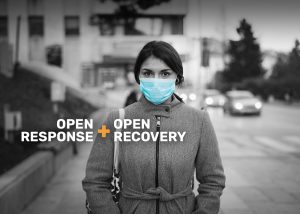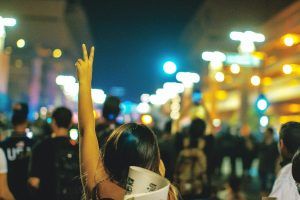Covid-19 and the Shrinking Space for Dissent
Activists in developing countries are seeing civic space shrink as the pandemic takes hold
This article was first published by Apolitical. Click here to read the original article.
On 15 March, a group of civil society activists peacefully gathered in Niger’s capital, Niamey, to protest about unfolding corruption allegations involving the embezzlement of vast public funds from the country’s defence sector.
The authorities’ response was ruthless. Security forces fired teargas into the crowd and three people died when a nearby market caught fire. At least 15 people were arrested and detained, including three members of Publish What You Pay — the global movement fighting for transparency in the oil, gas and mineral sector. Three weeks later, my colleague and friend Ali Idrissa, a prominent human rightsAn essential part of open government includes protecting the sacred freedoms and rights of all citizens, including the most vulnerable groups, and holding those who violate human rights accountable. T... advocate and a member of PWYP’s Board, was also jailed, before being released on bail. He’s now been charged with defamation and disseminating information “aimed at disturbing public order”.
This tale of authorities cracking down on anti-corruption protestors in one of the world’s poorest countries (which also happens to be one of the world’s largest exporters of uranium), might sound grimly familiar. But there’s another component to it. The clampdown in Niger is being carried out under the guise of stopping the spread of Covid-19.
It is a pattern we see across the world, as the new emergency powers invoked by governments to tackle the global pandemic can just as easily be used by would-be autocrats to stifle debate, evade scrutiny, and consolidate their own power.
In Brazil, for example, President Bolsonaro signed a measure restricting public access to government information. And in places as diverse as Hungary, Turkey, the United States, the Republic of Congo, and the Philippines, activists have called foul on governments who they see as exploiting the public health emergency to shut down civic space.
Yet upholding the tenets of open government accountability, transparencyAccording to OGP’s Articles of Governance, transparency occurs when “government-held information (including on activities and decisions) is open, comprehensive, timely, freely available to the pub... More, inclusivity, and responsiveness is now more crucial than ever. These principles can help protect societies from future pandemics, and rebuild economies ravaged by the current one. Embracing them, in fact, is the only way our future political, financial and economic systems will be equitable and sustainable.
Decrepit health systems
What’s more, governments who have applied these principles, specifically in how they manage their natural resources are better equipped to deal with the emergency today.
Resource-rich nations which have properly managed their oil, gas and mining revenues by investing them in health infrastructure and other basic social services can protect their populations better than those where revenues have been mismanaged, or stolen.
If health systems in some of the world’s biggest economies are cracking under the strain of the current crisis, one can barely imagine how those across Africa — which the World Health Organisation (WHO) said could be the next epicentre of the disease — will cope. The WHO has also reported that 41 African countries, with populations totalling hundreds of millions of people, have just 2,000 working ventilators between them. Niger, for example, has 20 ventilators; the Central African Republic (CAR) has three; and Somalia has none. By contrast, Germany had 25,000 ventilators before the pandemic took hold.
Of course, countries’ dilapidated public health systems are not solely (or always) the result of mismanaging revenues from their extractive sectors, but how can it be that Nigeria, Africa’s biggest oil producer, has just 169 ventilators for a population of 195 million?
Transparency and accountability
Such grave disparities — with fatal consequences for so many people — have led PWYP members from the Republic of Congo and Zimbabwe, among others, to urgently call for more transparency and accountability on how revenues from their countries’ extractive industriesApplying open government values of transparency, participation, and accountability to extractive industries can decrease corruption, safeguard community interests and needs, and support environmental ... are spent: not only so that they can be directed to fighting this pandemic, but the next one, when it occurs.
So far, their calls aren’t being heeded. Instead, we are seeing increased attempts at corporate capture of the state.
Oil, gas and mining interests worldwide are lobbying hard for bail-out packages, which should be going to small and vulnerable businesses and workers and to sectors which can set countries on a path of economic development which isn’t overly reliant on fossil fuels — an unprecedented opportunity at a time when the price of crude oil has plummeted to its lowest value in decades.
So while the crisis has emboldened some governments to intensify their crackdowns on civic space, now more than ever, governments, business leaders and civil society members should join forces to ensure that accountability, transparency, inclusivity and responsiveness are at the heart of the recovery from the emergency.
The global upheaval Covid-19 has triggered will undoubtedly lead to radical changes across the board: to our economies, our laws, and our social fabrics. It is up to us to ensure that rather than amplifying existing injustices and inequalities, they lessen them.
No comments yet
Related Content

Open Response + Open Recovery
Our community’s fundamental values of accountability, transparency, inclusivity, and responsiveness are vital as we move through COVID-19 response to recovery. Find resources, events and examples from OGP and partners.

Statement on the COVID-19 response from civil society members of OGP Steering Committee
 Challenges and Solutions
Challenges and Solutions
Open Response, Open Recovery
OGP CEO Sanjay Pradhan writes about how the COVID-19 pandemic has compelled governments and citizens alike to take unprecedented, mitigating actions. In their shared struggle, mutual trust between government and…


Leave a Reply